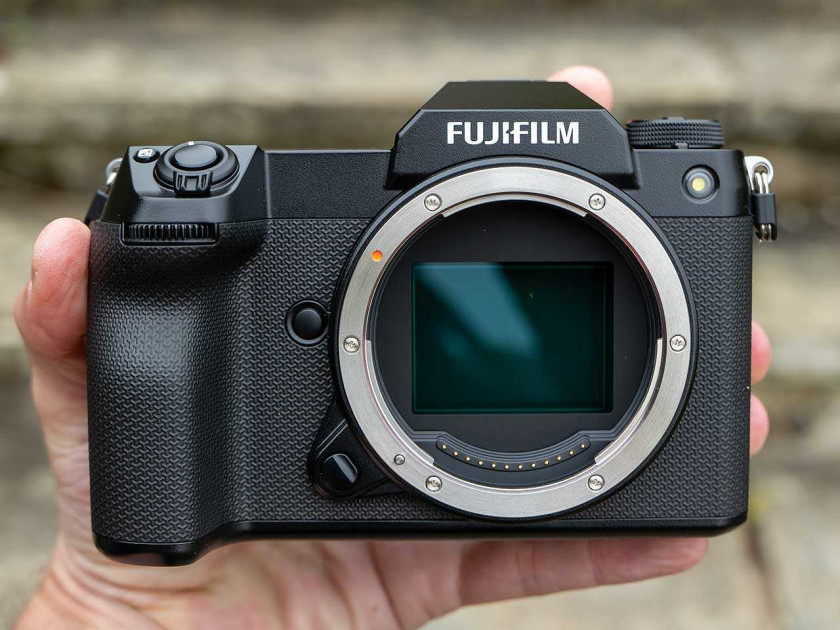
[ad_1]
Introduction
The GFX 100S II is the seventh medium-format mirrorless camera that Fujifilm have released since 2019, and as the name suggests, the fourth to have a massive 100 megapixels. It uses a completely new 102 megapixel high-speed image sensor called the “GFX 102MP CMOS II” and the very latest X-Processor 5. This is not a high-speed sensor like the one used in the GFX 100 II, but Fujfilm claim that it does offer very similar image quality. The sensor inside the GFX 100S II physically measures 43.8×32.9mm, which is much larger than the 36x24mm sensor found in a 35mm full-frame camera – approximately 1.7x larger in fact. As well as more resolution for bigger prints and aggressive cropping, the large sensor format promises to deliver better image quality and greater depth of field without compromising too much on the size and weight of the camera when compared to a typical 35mm model. It has exactly the same body as the original GFX 100S, except for the new Bishamon-tex textured covering which enhances the grip strength at various angles when holding the camera. The weight has still been reduced from the previous version, with the GFX 100S II weighing in at just 883g, making it the lightest model in the GFX series. It features five-axis in-body image stabilization (IBIS) which provides a compensation rating of up to 8 stops when certain specified lenses are used. There’s also an improved eletrconiv viewfinder (EVF) with a magnification of 0.84x and 5.76 million dots, special 400 megapixel Pixel Shift Multi-Shot mode, AI-based subject-detection AF developed with Deep Learning technology, twenty film simulation modes, up to 7fps continuous shooting speeds, 4K/30p recording and dual UHS-II SD memory card slots. The Fujifilm GFX 100S II is priced at £4999 / €5499 / $4999 body-only in the UK, Europe and USA respectively. It is designed and made in Japan. The new MHG-GFX S metal hand grip optional accessory enhances the grip and stability when shooting with larger telephoto lenses and also improves convenience when using a tripod.
Sample Images
This is a selection of sample images from the Fujifilm GFX 100S II camera, which were all taken using the 102 megapixel Superfine JPEG setting. The thumbnails below link to the full-sized versions, which have not been altered in any way.
Sample RAW Images
The Fujifilm GFX 100S II enables users to capture RAW and JPEG format files. We’ve provided some Fujifilm RAW (RAF) samples for you to download (thumbnail images shown below are not 100% representative).
Sample Movies & Video
This is a sample 4K movie at the quality setting of 3840×2160 pixels at 60 frames per second.
This is a sample 5x slow-motion 1080p movie at the quality setting of 1920×1080 pixels at 24 frames per second.
Product Images
Main Rivals
Listed below are some of the rivals of the Fujifilm GFX 100S II.
The Fujifilm GFX 100 II is a 100-megapixel, 8K video, 8-stop IBIS, 8fps continuous shooting, medium-format monster that is light enough to use all day, indoors and out. Find out just how good it is by reading our in-depth Fujifilm GFX 100 II review, complete with a gallery of full-size sample JPEG / Raw images and videos…
It’s not every day that a 100 megapixel camera hits the market, and certainly not every day that we get to review one. So without further ado, here’s our in-depth review of the brand new Fujifilm GFX 100 medium format mirrorless camera, complete with full-size sample images and videos…
The new 100-megapixel medium-format Fuji GFX 100S is smaller, lighter and more versatile than the flagship GFX 100, and crucially, significantly cheaper too. So much so that it steps on the toes of high-end 35mm full-frame cameras like the Sony Alpha 1, Canon EOS R5 and Nikon Z7 II. Does the GFX 100S really prove that medium-format is “More than full-frame”, and is it really better than the GFX 100? Find out now by reading our in-depth review, complete with a huge gallery of full-size sample images and videos…
The Fujifilm GFX 50R is a rangefinder-style medium-format mirrorless camera with a 50 megapixel sensor, 3.2-inch tilting touchscreen LCD, electronic viewfinder, ISO range of 50-102400, dual memory card slots and 3fps continuous shooting. Oh, and it only costs £3999 / $4499, making it the cheapest medium format camera on the market. Read our detailed Fujifilm GFX 50R review now…
The new Fuji GFX 50S II is the most affordable medium-format ever released – it’s so cheap that it competes with high-end 35mm full-frame cameras like the Sony Alpha 7R IV, Canon EOS R5 and Nikon Z7 II. But surely there’s a catch – is it just too affordable for its own good? Find out now by reading our in-depth Fujifilm GFX 50S II review, complete with full-size sample photos and videos…
The Fujifilm GFX 50S is a new medium-format mirrorless camera, offering a 50 megapixel sensor, a 3.2-inch tilting touchscreen LCD and a removable electronic viewfinder in a body that’s no bigger than a 35mm full-frame DSLR. Read our in-depth Fujifilm GFX 50S review now…
The Leica SL3 is a brand new digital camera with a 60 megapixel sensor, 8K/30p video recording and a hybrid AF system. Does this premium take on a 35mm full-frame interchangeable lens camera deliver premium results? Find out now by reading our in-depth Leica SL3 review, complete with full-size sample photos and videos…
The Sony Alpha 1 camera, or Sony A1 for short, is the best camera that Sony have ever released, and currently the best all-round camera on the market. It’s also one of the most expensive, so read our in-depth Sony A1 review complete with full-size sample JPEG and Raw photos and movies to find out if it’s truly the One for you…
The Sony A7R V full-frame camera is a hybrid powerhouse that in some ways outperforms even the flagship Alpha 1 model. Can this exciting camera really meet the needs of all kinds of photographers? Read our in-depth Sony A7R V review to find out…
Your Comments
[ad_2]






